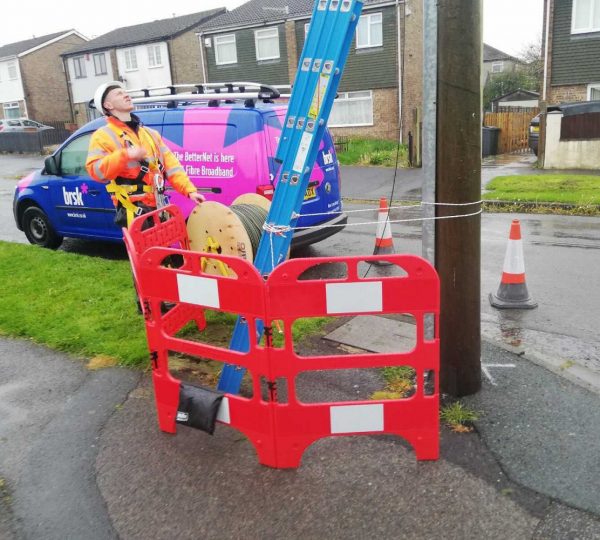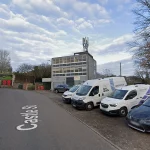MS3 and Brsk Face More Protests Against UK Broadband Poles

Alternative network operators MS3 and Brsk are separately facing more public protests against their use of wood poles for the deployment of new gigabit-speed Fibre-to-the-Premises (FTTP) broadband ISP networks, this time in Hull (East Yorkshire) and St Helens (Merseyside), respectively.
Poles are popular because they’re quick and cost-effective to build (trenching is significantly more expensive), can be deployed in areas where there may be no space or access agreement to safely put or share new underground cables, are less disruptive (avoiding the noise, access restrictions and damage to pavements of major street works) and can be built under Permitted Development (PD) rights with only minimal prior notice.
However, many other people dislike them, typically due to perceptions of their negative visual appearance, as well as concerns about exposure to damage from major storms (example), deployments in areas of outstanding natural beauty or where poles haven’t existed before, the lack of more effective prior consultation, engineers that fail to follow safety rules while building and contractors that sometimes try to force them into small private gardens (rare, but we have seen it happen).
Advertisement
The latest examples of this come, firstly, from residents living on Scholars Drive in Hull who have just signed a petition against MS3’s decision to roll out poles in their area (BBC News), which has previously only had underground infrastructure. But despite the local objections, MS3 plan to continue the roll-out and locals have now started a wider petition.
Peter North, Local Councillor, said:
“[Residents have] unanimously opposed MS3’s proposals to install telegraph poles on their street. We will continue to support the residents who have done an incredible job of bringing the community together to resist this unwanted development. We hope that MS3 will reconsider their plans and install infrastructure that is more considerate to residents’ wishes.”
Meanwhile, over in Merseyside, residents of Billinge have been campaigning outside St Helens town hall against Brsk’s (Netomnia) local deployment of poles for similar reasons (St Helens Star). The related Billinge Together campaign claims “residents absolutely do not want poles” and have been calling on the council to “impose reasonable conditions and place on hold any work permits given to BRSK.”
The campaign group added that they also want to “ensure effective consultation with local residents, which is verifiable by evidence” (e.g. letters to every household, public meetings etc.) and for independent, as well as verifiable checks, to be undertaken on the suitability of underground methods of delivering full fibre broadband. Once again, there’s also a call for the UK government to block future pole deployments until a review has taken place.
A Spokesperson for Brsk said (July 2024):
“We will always endeavour to use as much existing infrastructure as possible, [as] this benefits our roll out in making it more efficient and faster to connect customers.
However, sometimes the existing infrastructure is insufficient for us to serve some premises, and on these occasions, we need to upgrade the infrastructure to provide services to all residents.
Recently, we conducted a thorough survey in Billinge and found that the existing infrastructure is not usable.
The area is currently served by buried cables and as such, no infrastructure exists that can be used.”
We should point out that Billinge is currently already covered by Virgin Media’s gigabit-capable broadband network. The same location is also planned to be covered by Openreach’s FTTP network in the near future, but it’s currently unclear whether the latter will be done by pole or underground (Openreach are likely to run into the same issues as Brsk).
Advertisement
As for Scholars Drive in Hull. The area already appears to have been reached by KCOM’s largely underground FTTP network, although both MS3 and Connexin have already covered most of the surrounding areas with similar technology.
However, KCOM has historically made it quite difficult and unattractive for rival operators to harness their existing cable ducts, which is why poles are often used. But the local incumbent is currently developing a trial with Connexin that may provide a future solution (here), although this remains a highly tentative proposition.
Finally, both the previous and current UK government have recently made it clear to network operators that they want them to “share existing infrastructure when installing broadband cables as the default approach; and where new infrastructure is needed, to install underground wherever possible before deploying new telegraph poles” (here and here). But network operators often correctly argue that this is what they already do.
The government is also working on a revision to the existing 2016 Code of Practice for all this, which is expected to result in more community meetings and better pre-build notifications (i.e. adding extra costs and time to network builds, but not stopping them).
Advertisement
The government naturally can’t completely stop poles from being deployed without damaging their own coverage targets, particularly after they pledged to make a “renewed push to fulfil the ambition of full gigabit [broadband] and national 5G coverage by 2030” (here) and are set to soften existing planning rules.
At the same time it’s important not to forget the many people who do want to see the new networks being deployment, regardless of whether it comes via poles, underground or otherwise. The greater competition typically results in lower prices, more choice of service and speeds etc. Poles have long been a common sight across much of the UK, and there are over 4 million of them in service.
Mark is a professional technology writer, IT consultant and computer engineer from Dorset (England), he also founded ISPreview in 1999 and enjoys analysing the latest telecoms and broadband developments. Find me on X (Twitter), Mastodon, Facebook, BlueSky, Threads.net and Linkedin.
« Full Fibre Builder and UK Broadband ISP toob Launch Reward Scheme






















































Now im not a fan of poles, or PIA in general however, most Alt Nets use this as the delivery/network build.
As highlighted, digging costs more… i dont know what BBI is available in the areas but im guessing the residents wont want to pay higher cost for connection to the network if MS3/BRSK dug the streets to connect.
I get you may have an issue with the way a pole looks but why are you not a fan of pia?? Surely pia alleviates the need for new providers to build new poles??
“[Residents have] unanimously opposed MS3’s proposals to install telegraph poles on their street”
Really? I think any meaningful petition should include a counter-petition, so everyone who is canvassed can state an opinion either FOR or AGAINST the proposal, and these can be weighed against each other.
Having said that, publicly expressing an opinion in favour of poles in some of these areas might carry the risk of getting your house attacked.
Do you want additional poles on your street, is a very different question to “do you want cheaper broadband in line with cheaper pricing available across the UK?”
I’m not sure why the two issues are being conflated in the way they are.
If there is no existing gigabit infrastructure then poles may be well be justified. If there’s existing gigabit infrastructure underground that’s a harder sell.
I think all the complaints have been from areas that have at least one gigabit supplier already (VM Coax or FTTP) as well as generally having underground infrastructure. Although I have seen a couple of complaints where poles exist and new ones duplicating those poles by another operator have been put up.
Residents should be given the option to compel MS3 / Brsk / other providers to install their equipment underground, provided that they compensate the network for any additional expense. I think this sort of compromise would do a good job at satisfying the needs of both parties 🙂
Most of the country is skimp, very likely these people would not be able to afford paying for digging. And why would they? The govt squanders millions on funding for certain homes, they can just wait for their piece of the pie
The residents may not want MS3 at all, they certainly wouldn’t want to compensate a company for something they aren’t going to use.
If every resident signed an affidavit saying they will not purchase a service from the altnet for the next 10 years, maybe they’d give it up as a bad commercial investment….
Is underground build what everybody wants? Takes quite a bit longer, and I’m personally not a fan of how it leaves some of the areas looking.
Particularly if it comes with additional cost, and allocating that cost to users seems pretty unworkable to me.
I think it could be quite simple. If the residents of Any Street object to Provider A installing poles on the street, then they might have 30 days to file an objection. At that point Provider A would be obliged to offer an underground alternative, sharing the cost of that alternative with the residents on the street. It would be up to the residents to agree how to raise the funds — if they don’t pay within, say, 30 days, then Provider A can ignore the objection and proceed with installing poles.
In terms of “what if residents don’t want Provider A to install infrastructure on their street”… In my mind that’s just tough. Unless it’s a private road, networks can install their equipment without having to get agreement from residents. I don’t think that’s unreasonable — if people want the “benefits” of living on a private road then they’ll have to pay for them.
This makes no sense. In 10 years time half the street will be completely new households as people move in and out. Current residents should have zero ability to decide whether a street gets critical infrastructure. You don’t get to decide whether your street is hooked up to mains gas just because you only use electric.
I think it makes perfect sense. Residents shouldn’t be allowed to block infrastructure (for the reasons you’ve stated) but if they want to pay for it to be installed differently then I don’t see any problem with that.
It’s almost like these residents have stockholm syndrome for KCOM.
KCOM has basically had a monopoly on offering broadband in Hull for as long as I can remember, and it always comes up when people want to get out of contract with another provider with the classic line “Oh I’m moving to Hull, can you transfer my service there”.
If residents don’t want poles and there’s no existing/suitable underground infrastructure, that feels like something local councils could subsidize the cost of under the proviso the ducting is made available to any provider, in a similar way to Openreach’s PIA.
I am on a few of the groups and notice the very same people complaining are using the new providers to get a better deal out of KCOM so it is having some benefit to them… 😉
Good local* provider, unlike the big companies like BT and Liberty Global.
*Owned by Macquarie Infrastructure, based in Australia, formerly part-owner of Thames Water tripling its debt during the 11 years they led the consortium of owners while paying out £2.7 billion in dividends, receiving about double the return on investment that would be expected. Best of all through some cunning financial wizardry transferring £2 billion of the £2.8 billion they borrowed to buy Thames Water to the business itself in contravention of the conditions set out by the regulator at the time of the purchase.
You know what though three providers on the same street? No wonder they can’t afford to do duct. Perhaps if it was one provider laying duct providing access at pia prices to whoever wants to install cables we’d be in a more sensible position?
The reduced pricing may be an interesting point if it’s in an area where it is subject to SMP obligations.
I hope Ofcom is looking at this carefully and they don’t hide behind it not being a regulatory priority as they ate busy elsewhere. Fair competition is fair competition; and the people of Hull should enjoy consistent and appropriate regulation.
Give. The history here I suspect the council getting involved would be something they very, very much would be against. It would actually be surreal.
Duplication of connections will come at a cost. Competition reduces prices for those savvy enough to game the system but increases prices for those who are complacent or unaware. Then there is a problem with hidden costs masking the true cost of the service. This is something we have experienced with competition between ISPs on openreach and ofcom has intervened to curb abuses. It has also arisen with energy suppliers and became such a problem that the government had to bring in price caps. At the end of the day all this extra hardware has to be paid for, and guess who will pick up the bill.
I’m not sure it’s quite that straightforward.
Profitability is reduced, and it doesn’t necessarily cost the end user more (in fact it often reduces prices for them).
It’s like the wild west with some areas being dug up four or five times to install all these lines for the different providers. Imagine if we did that with water companies or the electric and gas companies: a different pipe for each provider. Plus, if you switch providers you’re then stuck with existing wiring on your property plus more being run to provide the other network’s service..
a thin fibre cable is just the same as a water pipe? get real
It is essential Sir Chris Bryant after writing to telecommunications operators ,to advise he expects and wants sharing of infrastructure to be the default practise when there is existing FFTP gigabit capable infrastructure . Let’s hopehe makes it very clear to code operators that this will be mandatory if code operators continue to duplicate , triplicate or more installing unnecessary infrastructure at the round table meeting 12th September . Permitted Development legislation for telecommunications installations certainly needs amendment to ensure duplication and more of infrastructure is prevented . Regarding Hull the area has underground infrastructure that could be shared. MS3 should be following government direction . Guy Miller CEO of MS3 is chair of the INCA special interest group for sharing infrastructure.MS3 should be practising what he preaches . Yes most residents would be happy with the provision of choice of ISP but the infrastructure is largely unnecessary
If altnets that erect poles are forced to give PIA style access to other operators, this problem will disappear as the economics will shift to exclusive underground deployment.
Provision on a PIA equivalent in Hull massively oversimplifies things. I know a lot of the new operators think that’s an obvious easy answer, but I’m not sure I agree.
KCOM is never going to benefit from the economy of scale that OR enjoys. And look back at the history of OR PIA pricing. It wasn’t cheap when it started.
And the unknown just now is what happens to PIA pricing when there much reduced voice usage. Will that change the cost allocations and potentially drive up PIA costs?!?
On the other hand MS3 installs poles and doesn’t give KCOM a penny or KCOM lets them use their ducts and gets PIA money. If KCOM is just being anticompetitive then it’s up to Ofcom to deal with them.
KCOM doesn’t have PIA rates, it’s a different regulatory framework in Hull. The difficulty for all parties is that it costs to build the commercial process and, without the scale, it becomes really hard to find something that works for all parties.
Other operators outside of KCOM and BT don’t have SMP and don’t have to share their network; that’s driven by the SMP obligations. Of course, they may agree to do so on commercial terms.
The FTTP rollout should have been treated like water and gas is from the start, with only one underground line to each house and then shared by service providers.
Its absolutely archaic to be installing poles or digging multiple holes for different providers. Our streets are being ruined for to satisfy a small term business plan from popup ISPs.
Which is basically what France has done. The cables from the premises to the cabinets are a regulated monopoly with fixed pricing then the various networks run to the cabinets and changing networks is just a matter of unplugging from one terminal and into another.
In principle I don’t disagree — in my mind it would’ve been better if some publicly-owned company ran dark fibre to each home, with street cabinets at the end of each road to enable ISPs to connect homes to their infrastructure. I believe they have a system like that in France. But alas, that’s not what we’ve got.
Someone with sense . All for upgrading infrastructure if necessary but just one infrastructure , not multiple infrastructures , preferably underground as that’s the way it has been built increasingly for the last 40 years
Looking at the picture on top of the poles I’d be concerned about safety whilst work is carried out.
I have completely given up any hope of an upgraded Internet connection in my area and lifetime since an MS3 pole was removed following complaints to Ongo Homes, Northern Lincolnshire’ largest social housing provider earlier in the year. Once MS3 removed the pole I knew they would never reinstate it so I decided to move permanently to a 5G Home Broadband solution from Three and I have never been happier. Thanks to 5G Home Broadband I now get speeds comparable to what MS3 would offer if they cared more about what customers want rather than the NIMBYS but I don’t care about these stupid pole protests any more because I more than satisfied with my 5G Home Broadband for the foreseeable future. NIMBYS rule? Only if you’re MS3